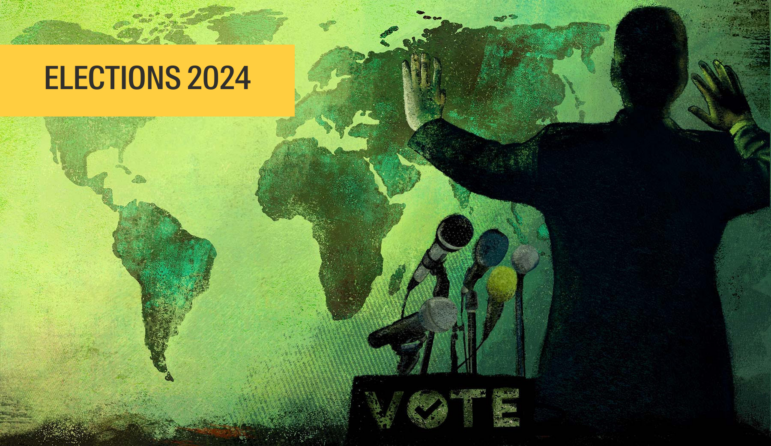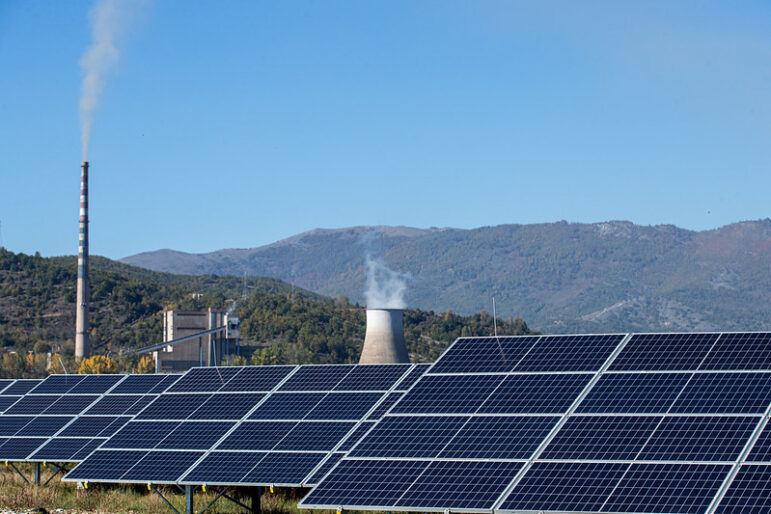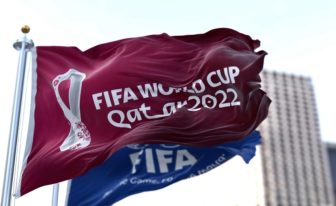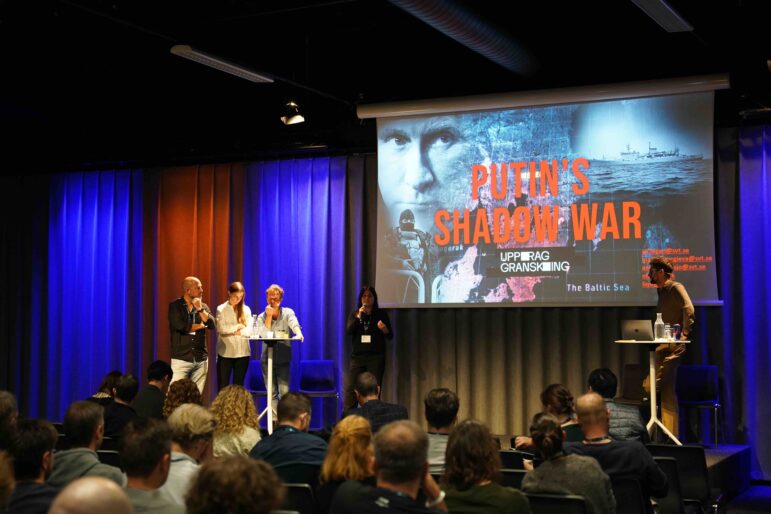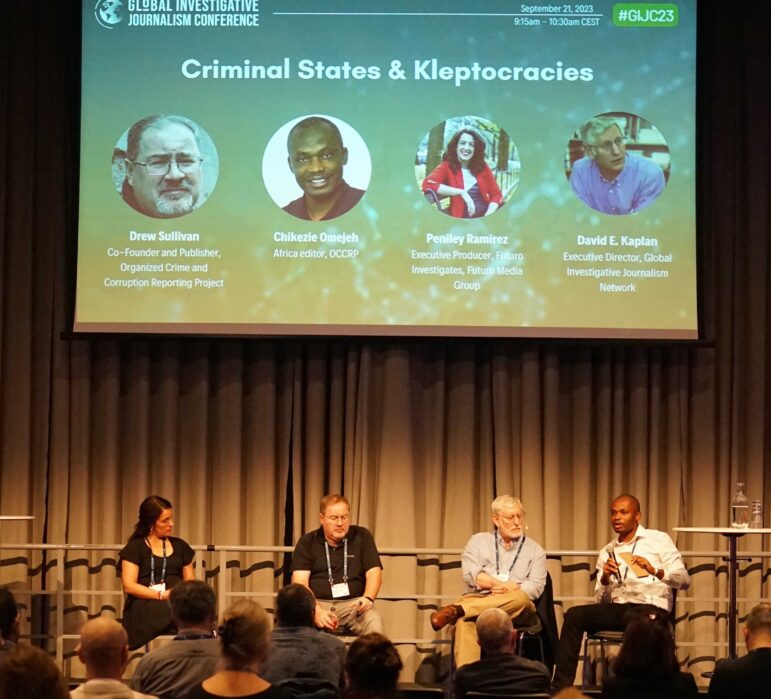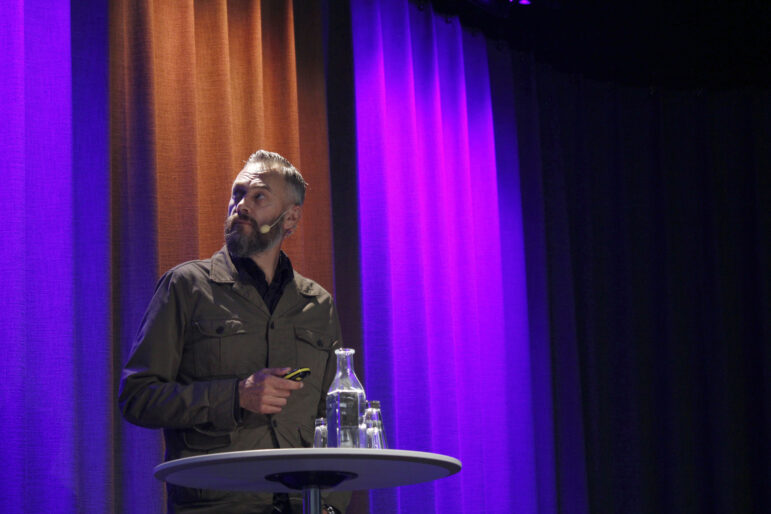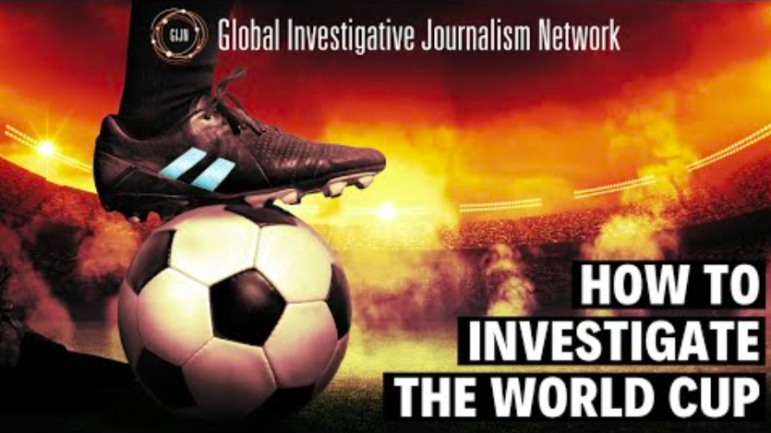

Image: GIJN
Tips for Investigating Football and the World Cup in Qatar
Read this article in
This post is based on GIJN’s recent webinar on how to investigate football and the 2022 World Cup in Qatar. You can watch the full webinar on GIJN’s YouTube channel or at the bottom of this post.
The investigative focus on professional football (soccer for you Americans) – and the choice of Qatar to host the FIFA World Cup later this year – centers around corruption in construction and hosting bids. This is understandably the case, given the breathtaking string of high-level scandals in “the beautiful game” during the past 12 years, which include rampant vote-buying and the FBI’s arrest of nine FIFA officials on a single day in 2015. (FIFA is football’s global governing body, with 211 national member associations.)
But a panel of veteran investigators at a recent GIJN webinar stressed that there are other football-related topics for watchdog reporters to dig into in 2022 and 2023 – including systemic sexism and (covered-up) sexual abuse, authoritarian “sportswashing,” lethal labor abuses, money laundering, stadium safety, and even the quiet abandonment of noble, stated goals by local football bodies.
The panel featured former FIFA whistleblower and author Bonita Mersiades, football investigative specialist Romain Molina, and David Conn – a sports reporter at the Guardian in the UK who is author of both “The Beautiful Game?” and “The Fall of the House of FIFA.”
“It’s really good for people to understand that sport and football are very much areas for investigative journalism,” Conn said. “Of course, the vast majority of people who love football want to watch the action, support their club, love the players, and play the game themselves. I’m a football lover myself. But it’s partly because of this popularity that it has been under-recognized as a focus for investigation over the years.”
How important – to an autocrat – is hosting a football World Cup? According to Conn, Russia’s contentious winning bid to host the FIFA World Cup 2018 “very much boosted Vladimir Putin’s profile, and his sense of his own importance – and I believe it helped embolden Putin to start a horrific war” in Ukraine.
Molina, who has contributed stories on football abuses to The New York Times, the Guardian, and the BBC, encouraged journalists to abandon even basic assumptions about ethical and legal norms among organizers of the professional game. Instead, he urged investigators to keep an open mind about the darkest claims from sources – whether they’re alleging the sport enables widespread sexual abuse or has criminal connections.
Likewise, Mersiades – a former executive with Australia’s football governing body, and author of “Whatever It Takes: the Inside Story of the FIFA Way” – warned that journalists should not ignore or minimize the cronyism that led to Russia’s controversial role as host of the 2018 FIFA World Cup.
“While everyone is focused on Qatar right now – because that’s happening in a couple of months’ time – let’s not forget that these were two [host nation] decisions taken together, and they have been the single biggest enablers of Russia and Qatar over a 12-year period,” Mersiades argued. “Russia was just as corrupt as Qatar – probably even more corrupt, and yet everyone went to Russia in 2018 and enjoyed it. Journalists: don’t forget it – things haven’t changed.”
Conn said it was important for even non-sport journalists to understand the basic structure of professional football: under-resourced “grass-roots” levels; nonprofit national football federations; privately-owned clubs, and the globally popular leagues that they effectively run; owners and agents; and continental confederations, which are affiliated to the global body, FIFA.
Conn also made an important point about the potential audience for these investigations. He said that unethical behavior in football is actually worse than similar, illicit behavior in business for many people, because fans invest far more than their money in the clubs they support.
“Football is not just a business,” Conn pointed out. “Let’s say you are investigating corruption. I believe it’s additionally bad in football than if the corruption was in the steel or car industry. It’s a sport, a game, and it’s some people’s whole lives.”
Conn emphasized that basic, non-criminal accountability stories therefore carry more weight, even if they simply involve checking the mission statements of local football federations, and revealing how those goals have been abandoned.
Investigating Labor Abuses at World Cup 2022 in Qatar
The panel agreed that the abuse of migrant laborers in Qatar – from unsafe working conditions to virtual slave labor – will continue to be an important investigative topic ahead of and during this year’s World Cup.
“Remember that FIFA granted a vast construction project to a country that did not have good conditions, or rights for its construction workers,” Conn noted.
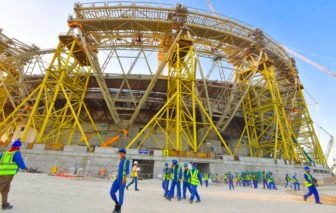
Workers walk towards the construction site of the Lusail Stadium, which is scheduled to host the opening and final matches of the Qatar 2022 World Cup. Image: Shutterstock
“It’s simply too hot, and not safe even for young men in their prime to be working for hours in these conditions, and they’re doing the hardest work,” he explained. “As Amnesty International has highlighted, young migrant men are just dying, some in their bedrooms. And the Qataris are not giving proper explanations – like ‘it was a heart attack,’ or ‘he had breathing problems.’”
Originally scheduled for summer, the Cup has since been moved to Qatar’s winter season (this November – December), due to health concerns about the players and fans suffering under the region’s sweltering heat. However, this makes it more difficult for reporters to cover World Cup labor abuses during the actual event.
To combat this, Conn said reporters attending the event – or, ideally, visiting beforehand – can go report in the country’s migrant labor residential camps to gather information about work casualties and conditions.
“The Qataris actually will open labor camps to journalists, because they’ve now improved conditions and they’re quite proud,” he explained. “See the divisions in the society there. These are very big places, and you can talk to people there unguardedly, not necessarily with the authorities looking over your shoulder.”
The speakers had a range of suggestions for journalists seeking to dig into the sport.
General Tips for Investigating Football
- Look for official sources in smaller countries. These sources can have deep global contacts, but often fewer gate-keepers to access. “Focus on little nations,” said Molina. “Remember that the vote of Laos has the same weight as France or England – and contact local journalists in those nations who know those officials. You will find some astonishing things that connect to big issues. They know the big fish; maybe one day they can be a whistleblower, like Bonita (Mersiades).”
- Check on the condition of stadiums, safety policies, and changes in budgets. “The huge money in football could help with things like unsafe and rundown stadiums – that’s an important area for investigation today,” Conn explained. “Recently in Paris, we nearly saw another disaster for Liverpool fans and others, and we did see a fatal stadium disaster in Cameroon – just this year. I’ve talked to people saying stadium safety is an increasing problem. Are clubs pinching money from safety areas?”
- Attract whistleblowers by publishing initial, smaller stories on wrongdoing. Echoing the “stories get stories” mantra of another recent GIJN panelist – Financial Times reporter Dan McCrum – Mersiades said initial published stories on questionable practices are especially effective at unearthing inside sources in the football industry. “In 2016, I published a story on my own website to test the waters, and no one sued me; no one said I was wrong – and many people contacted me and said, ‘Ah, you’ve got it, and this is what I know about it.’ The story emboldened others.”
- Start with the mission statement of your local football body. “These are nonprofits, and you will find in their founding documents a statement of noble intention: ‘We are here to promote this wonderful game for the good of everyone,’” said Conn. “There is also a core element to covering sport which is just holding sport to account for its own claims.”
- Investigate the increasingly uneven distribution of money in football – including women’s leagues and inner city schools. “This is a live issue: Where is the money going?” asked Conn. “Why are some people playing in terrible facilities, or have no access at all, when there are billions and billions of dollars in the game around the world.”
- Look out for patterns of sexual abuse and cover-ups in the sport – and engage with individual victims with sensitivity. Consider guides like this one.
- Re-examine evidence in plain sight – like photos and annual reports. Football contains a massive image archive of elites from diverse sectors interacting – from oligarchs to financiers and presidents – and Mersiades said looking through photos has helped her piece together important investigative timelines. And by simply reading annual reports, she found that one federation board member was receiving a $600,000 annual salary as a volunteer on a second governing board. “No one had bothered to look at that before, but that was out there in the public,” she said.
“It’s hugely important that, when the world cup starts in Qatar, the first whistle doesn’t blow, and the moment for covering all these serious issues is finished, and we just focus on the football,” said Conn. “Because then Qatar gets the internationally broadcast PR that was the reason they bid in the first place.”
He added: “Remember to follow your instincts: that if there is something you feel is not right – even if it goes against the grain of what everyone else is saying – you just might be right.”
Additional Resources
8 Lessons from Investigations into the Olympics
Reporting on Migration in the Gulf: A Revised and Expanded GIJN Guide
Tips for Reporting on Human Trafficking and Forced Labor
Rowan Philp is a reporter for GIJN. He was formerly chief reporter for South Africa’s Sunday Times. As a foreign correspondent, he has reported on news, politics, corruption, and conflict from more than two dozen countries around the world.

